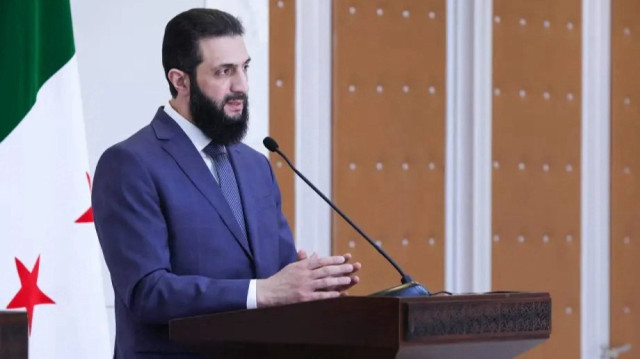
Leaders of Türkiye, Saudi Arabia and Qatar condemn Israeli strikes and oppose foreign interference
Syrian President Ahmed al-Sharaa received phone calls Thursday from Turkish President Recep Tayyip Erdogan, Saudi Crown Prince Mohammed bin Salman and Qatari Emir Sheikh Tamim bin Hamad Al Thani to discuss the latest developments in Syria, particularly the escalating situation in the country's south.
During the calls, the three leaders expressed full solidarity with Syria and reaffirmed their rejection of any foreign interference in the country's internal affairs, according to a statement from the Syrian presidency.
They specifically condemned and rejected repeated Israeli attacks on Syrian territory, describing them as “a dangerous escalation that threatens to destabilize the region and fuel further chaos.”
The leaders underscored their commitment to Syria's unity and territorial integrity and emphasized the importance of the Syrian state exercising full sovereignty over all of its land.
They also highlighted the need to restore security and stability across the country as a top priority for the benefit of all Syrians.
Al-Sharaa expressed his gratitude to Türkiye, Saudi Arabia and Qatar for their supportive positions and backing during what he called a critical time for the nation.
He reaffirmed the Syrian state's commitment to protecting all segments of its population, emphasizing that safeguarding the rights and security of every religious and ethnic group is a core responsibility of the government.
He also said that the current unrest is the result of weapons proliferation and external meddling.
He stressed that the Syrian government remains committed to holding accountable anyone who violates the law or refuses to abide by state authority in order to preserve national unity and protect the dignity and safety of all citizens.
The calls came a day after Israeli forces launched airstrikes on more than 160 targets across four areas of Syria – Suwayda, Daraa, Damascus and the Damascus countryside – killing three people and injuring 34 in the capital alone.
On June 13, clashes broke out between Bedouin Arab tribes and armed Druze groups in Suwayda. The violence escalated, leading to deadly attacks by Druze fighters on Syrian security forces deployed in the area. Dozens of soldiers were reportedly killed.
A temporary ceasefire was reached between government forces and local Druze factions but soon collapsed. Israeli airstrikes followed, targeting Syrian military positions and infrastructure.
Israel has cited the “protection of Druze communities” as a pretext for its attacks in Syria, especially in the country's south.
However, most Druze leaders in Syria have publicly rejected any foreign interference and reaffirmed their commitment to a unified Syrian state.
Following the fall of Bashar al-Assad in December 2024, Israel intensified its air campaign in Syria and declared the buffer zone between the two countries defunct alongside the 1974 Disengagement Agreement.
Assad, Syria's leader for nearly 25 years, fled to Russia in December, ending the Baath Party regime, which had been in power since 1963.
A new transitional administration led by President Sharaa was formed in Syria in January.







